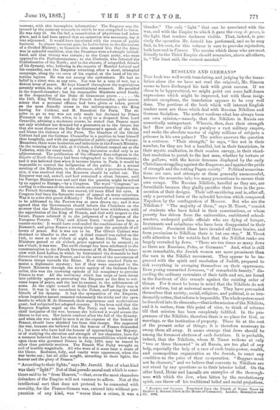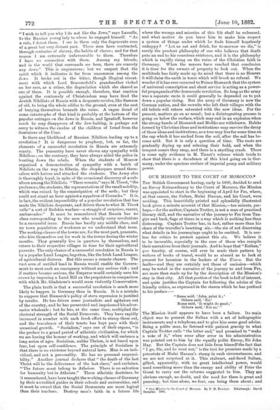RUSSIANS AND GERMANS*
Tins book was well worth translating, and judging by the trans- lation alone (for we have not read the original), Mr. Simeon seems to have discharged his task with great success. If we chose to be hypercritical, we might point out some half-dozen expressions which might be improved, but with these insig- nificant exceptions, the translation appears to be very well done. The portions of the book which will interest English readers most are those which deal with Russian Nihilism and German Socialism. The author confirms what has always been our own opinion,—namely, that the Nihilists in Russia are numerically unimportant. Wherein, then, does their strength lie ? How are they able to paralyse a vast military empire, and make the absolute master of eighty millions of subjects a prisoner in his own palace ? The author answers the question
in a sentence. "Their strength," he says, "lies not in their number, for they are but a handful, but in their fanaticism, in their mystic exaltation, in their sombre energy, in their stead- fast resolution to perish to the last man, whether by torture or the gallows, with the heroic firmness displayed by the early Christians struggling against the Emperors, and against the pride of strength and the rotting Pagan society." Political assassina- tions are rare, and attempts at them generally unsuccessful, because the assassins take too many precautions to ensure their own escape. The Russian Nihilists, handful as they are, are formidable because they gladly .sacrifice their lives in the pro- secution of their designs. Their self-sacrificing zeal is, after all, only a perverted form of the splendid heroism which conquered Napoleon by the conflagration of Moscow. But who are the Nihilists ? "The majority of them," says M. Tisscit, "consist of students who have failed in their examinations, or whom poverty has driven from the universities, embittered school- masters, underpaid public officials who are dying of hunger, lieutenants and subalterns who have been disappointed in their ambitions: Pessimist ideas have invaded all these brains, and from pessimism to Nihilism there is bat one step." M. Tissot calls attention to the notable fact that the Nihilist ranks are largely recruited by Jews. "There are ten times as many Jews as there are Russians, Poles, or Germans." And, what is still more remarkable, the Jewish women are more prominent than the men in the Nihilist movement. They appear to be im- pressed with the spirit and resolution of Judith, prepared to risk everything in avenging themselves on their oppressors. Even young unmarried Jewesses, "of remarkable beauty," dis- carding the ordinary restraints of their faith and sex, are found in the forefront of this crusade against the existing order of things. For it must be borne in mind that the Nihilists do not aim at reform, but at universal anarchy. They have persuaded themselves that society, social, religions, and political, is so irre- deemably rotten, that reform is impossible. The whole system must be dissolved into its elements,—thatis the mission of the Nihilists,
and it is useless, from this point of view, to think of reforms- till that mission has been completely fulfilled. In the pro- gramme of the Nihilists, therefore there is no place for God, or marriage, or the institution of property. These lie at the root of the present order of things ; it is therefore necessary to sweep them all away. It seems strange that Jews should be among the foremost abettors of such doctrines. It is probable, indeed, that the Nihilists, whom M. Tissot reckons at only "two or three thousand" in all Russia, are too glad of any help, especially the help of a race of such brain-power, wealth, and cosmopolitan organization as the Jewish, to exact any condition as the price of their co-operation. "Beggars must not be choosers," and we believe that converts to Nihilism are not vexed by any questions as to their interior belief. On the other hand, Heine and Lassalle are examples of the thorough- ness with which the Jew, when bitten by the revolutionary spirit, can throw off his traditional belief and racial prejudices.
• Ruaaians and Gernums. Translated Iron the French of Victor Tissot by Stepben L. Simeon (Clerk in the House of Commons). London : Remington and Co. 1882.
to the Russian young lady to whom he engaged himself. "As a rule, I detest them. I see in them only the degenerate sons of a great but very distant past. These men have contracted, through centuries of slavery, the habits of slaves ; and for that reason I am extremely unfavourable to them. Therefore I have no connection with them. Among my friends, and in the world that surrounds me here, there are scarcely any Jews." This is ungenerous ; but we suspect that the spirit which it indicates is far from uncommon among the Jews. It broke out in the bitter, though illogical resent- ment with which Lord Beaconsfield's grandmother visited on her race, as a crime, the degradation which she shared as one of them. It is possible enough, therefore, that reaction against the contumely of Christendom may have fired the Jewish Nihilists of Russia with a desperate resolve, like Samson of old, to bring the whole edifice to the ground, even at the cost of burying themselves beneath the ruins. A vague dread of some catastrophe of that kind is probably at the bottom of the popular outrages on the Jews in Russia, and Ignatieff, however much he may disapprove of the Jew-baiting, is perhaps not sorry to witness the exodus of the children of Israel from the dominions of the Czar.
18 there any likelihood of Russian Nihilism leading up to a revolution ? It is dangerous to prophesy, but, so far, the elements of a successful revolution in Russia are .extremely scanty. The peasantry have never shown any sympathy with Nihilism ; on the contrary, they have always aided the police in hunting down the rebels. When the students of Moscow organised a demonstration of sympathy with a batch of Nihilists on the way to Siberia, the shopkeepers armed them- selves with knives and attacked the students. The Army also is thoroughly loyal, in spite of the occasional discovery of a sub- altern among the Nihilists. "There remain," says M. Tissot, "the professors, the students, the representatives of the small nobility, which was ruined by the emancipation of the serfs ; but they could not stand an hour against a sqqadron of Cossacks." It is, in fact, the evident impossibility of a popular revolution that has made the Nihilists desperate, and driven them to what M. Tissot calls" a sort of Redskin warfare—a struggle of surprises, snares, ambuscades." It must be remembered that Russia has no class corresponding to the men who usually carry revolutions to a successful issue. Russia has hardly any middle class, and no town population of workmen as we understand that term. The working-classes of the towns are, for the most part, peasants, who hire themselves out for work in the towns during the winter months. They generally live in quarters by themselves, and return to their respective villages in time for their agricultural pursuits. The only chance of a successful revolution in Russia is by a popular Land League,begotten, like the Irish Land League, of agricultural distress. But this seems'a remote chance. The vast area of untilled land in Russia would enable the Govern- ment to meet such an emergency without any serious risk ; and if matters became serious, the Emperor would certainly save his crown by imposing a Land Bill on the proprietors in comparison with which Mr. Gladstone's would seem violently Conservative.
The Plain truth is that a successful revolution is much more likely to happen in Germany than in Russia. It is a mistake to suppose that Bismarck's policy of stern repression is justified by results. He has driven some journalists and agitators out of the country, and he has persecuted and imprisoned his adver- saries wholesale ; but he has, at the same time, multiplied the electoral strength of the Social Democrats. They have rapidly increased in number with each fresh effort to stamp them out, and the truculence of their tenets has kept pace with their numerical growth. "Socialism," says one of their organs, "is the preface to a grand period of atheistic civilisation, for which we are having the honour of working, and which will embrace a long series of ages. Socialism, unlike Theism, is not based upon fear, but upon self-confidence. The principle of Socialism is that there is no existence beyond natural laws. Man is an indi- vidual, and not a personality. Be has no personal responsi- bility." Another journal declares that" the death of the last Theist will be the deliverance of the last slave," and exclaims, "The future must belong to Atheism. There is no salvation for humanity but in Atheism." These atheistic doctrines, be it remembered, have been taught the working-classes of Germany by their accredited guides in their schools and universities, and it must be owned that the Social Democrats are more logical than their teachers. Destroy man's faith in a future life "I wish to tell you why I do not like the Jews," says Lassalle, where the wrongs and miseries of this life shall be redressed, and what motive do you leave him to make him respect a system of things under which lie finds himself hopelessly unhappy ? "Let us eat and drink, for to-morrow we die," is surely the prudent philosophy of one who believes that death puts an end to his conscious existence, and it is the philosophy which is rapidly rising on the ruins of the Christian faith in Germany. When the masses have reached that conclusion it is time for the owners of property to look out. When the multitude has fairly made up its mind that there is no Heaven it will claim the earth in tones which will brook no refusal. We wonder if it has ever occurred to Prince Bismarck that the system of universal conscription and short service is acting as a power- ful propaganda of the democratic revolution. So long as the army was a separate caste it could generally be depended on to put down a popular rising. But the army of Germany is now the German nation, and the recruits who left their villages with the old beliefs will return saturated with the new ideas. For the present, matters go on as usual ; but a disintegrating process is going on below the surface, which may end in an explosion when the strong hands of Bismarck and Moltke are withdrawn. Habits formed by Christian ideas and institutions may survive the decay of those ideas and institutions, as a tree may live for some time on the sap which it has sucked from the soil, after the soil has be- come arid. But it is only a question of time. The roots are gradually drying up and relaxing their hold, and when the tempest comes they snap, and there is a startling crash. There is some ugly evidence in M. Tissot's volume which tends to show that there is a decadence of this kind going on in Ger- many, under the specious surface of imperial pomp and military power.





































 Previous page
Previous page